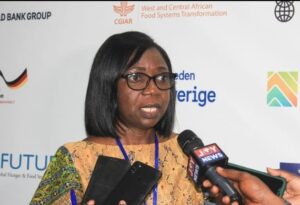The International Water Management Institute (IWMI) has introduced a farmer-led irrigation development (FLID) scheme in a bid to address the unsustainable nature of rain-fed agriculture.
The age-long nature-dependence and subsistence farming system has been identified as a major contributor, among others, to the seasonal food crop system and food insecurity situation in the country; hence, the introduction of the FLID scheme to promote all year-round production and food security.
The FLID initiative, which is a small-scale level irrigation scheme, involves enhancing the efficiency of water management systems, expanding and increasing irrigation reach, and introducing ultramodern technologies aimed at enabling a transition from rain-fed to commercial irrigation to increase food production, sustainability and security.
According to the institute, with entrepreneurs and farmers in Ghana and the sub-region already using groundwater, river or stream pumping, lowland/inland valley capture systems, and private small reservoirs, this feat can be realised when governments and development partners intensify their support for emerging irrigation systems like the FLID scheme.
The IWMI Representative for Ghana and West Africa, Dr. Olufunke Cofie, mentioned that the FLID innovation, which allows farmers to drive their own irrigation investments, is a potential solution to build climate resilience for smallholder farmers and transform food systems to support healthy diets for all.

She explained that research and practice had proven that dry season irrigation could more than double the yields of farmers; hence, the need to invest and increase land under irrigation cultivation on the continent from barely 10 percent currently.
“When farmers are adequately empowered with better production capacity, market access, and all other resources, their modest investment will result in substantial gains for themselves and other actors in the value chain.
“We need to invest more in the farmer-led irrigation systems to build climate-resilience for smallholder farmers and transform food systems to support healthy diets,” Dr. Cofie said.
Minister for Food and Agriculture Bryan Acheampong, in a speech read on his behalf by his deputy, Alhaji Mohammed Hardi Tufeeiru, stated that the global climate impact on agriculture can be mitigated, especially in Africa, through small-scale irrigation schemes.
He stated that though the government had undertaken a number of programmes to strengthen and boost the sector, more initiatives were needed to address emerging issues, especially the climate crisis. “This is where we need the continuous support from businesses, development partners, research and academia, and other stakeholders to build climate-resilient food system transformation,” he said.
These remarks were made at the opening of the FLID in sub-Saharan Africa knowledge exchange conference in Accra.
It was on the theme ‘Sub-Saharan Knowledge Exchange Conference”, and jointly sponsored by a USAID-funded innovation lab for small-scale irrigation (ILSSI), Water and Energy for Food, civil society organisations, and the World Bank.
Over 700,000 smallholder farmers in the country are said to be ready to embrace the small-scale irrigation model over the next 10 years to build resilience to the climate crisis.
The initiative will also explore strategies for addressing the remaining barriers and gaps through new knowledge and investment actions in the next five years.
Sustainable Development Sector Leader – World Bank office in Ghana, Lorenzo Carrera, hinted that the agricultural sector is highly vulnerable to climate variability and change as the sector is primarily dependent on rainfall.










